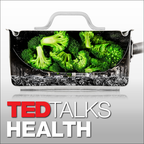
TED Health
Summary: What does exercise do to your brain? Can psychedelics treat depression? From smart daily habits to new medical breakthroughs, welcome to TED Health, with host Dr. Shoshana Ungerleider. TED speakers answer questions you never even knew you had, and share ideas you won't hear anywhere else, all around how we can live healthier lives.
- Visit Website
- RSS
- Artist: TED
- Copyright: TED Conferences LLC
Podcasts:
In long-term relationships, we often expect our beloved to be both best friend and erotic partner. But as Esther Perel argues, good and committed sex draws on two conflicting needs: our need for security and our need for surprise. So how do you sustain desire? With wit and eloquence, Perel lets us in on the mystery of erotic intelligence.
Our bodies get Vitamin D from the sun, but as dermatologist Richard Weller suggests, sunlight may confer another surprising benefit too. New research by his team shows that nitric oxide, a chemical transmitter stored in huge reserves in the skin, can be released by UV light, to great benefit for blood pressure and the cardiovascular system. What does it mean? Well, it might begin to explain why Scots get sick more than Australians ...
Patenting a new drug helps finance its immense cost to develop -- but that same patent can put advanced treatments out of reach for sick people in developing nations, at deadly cost. Ellen 't Hoen talks about an elegant, working solution to the problem: the Medicines Patent Pool.
When are humans most happy? To gather data on this question, Matt Killingsworth built an app, Track Your Happiness, that let people report their feelings in real time. Among the surprising results: We're often happiest when we're lost in the moment. And the flip side: The more our mind wanders, the less happy we can be.
Diseases of the body garner sympathy, says comedian Ruby Wax -- except those of the brain. Why is that? With dazzling energy and humor, Wax, diagnosed a decade ago with clinical depression, urges us to put an end to the stigma of mental illness.
One day, Ed Gavagan was sitting on the subway, watching two young med students practicing their knots. And a powerful memory washed over him -- of one shocking moment that changed his life forever. An unforgettable story of crime, skill and gratitude.
Nearly 450 million people are affected by mental illness worldwide. In wealthy nations, just half receive appropriate care, but in developing countries, close to 90 percent go untreated because psychiatrists are in such short supply. Vikram Patel outlines a highly promising approach -- training members of communities to give mental health interventions, empowering ordinary people to care for others.
When a freak tornado hit their hometown, sisters Caitria and Morgan O'Neill -- just 20 and 24 at the time -- realized they had to jump in and help. What they learned is: After a natural disaster, there's only a tiny window before the world turns its sympathy (and its donations) elsewhere -- so it's important to be prepared for every aspect of recovery. Watch this talk to learn how to step up in a timely fashion for your own community.
Parkinson's disease affects 6.3 million people worldwide, causing weakness and tremors, but there's no objective way to detect it early on. Yet. Applied mathematician and TED Fellow Max Little is testing a simple, cheap tool that in trials is able to detect Parkinson's with 99 percent accuracy -- in a 30-second phone call.
When game designer Jane McGonigal found herself bedridden and suicidal following a severe concussion, she had a fascinating idea for how to get better. She dove into the scientific research and created the healing game, SuperBetter. In this moving talk, McGonigal explains how a game can boost resilience -- and promises to add 7.5 minutes to your life.
When faced with a parent suffering from Alzheimer's, most of us respond with denial ("It won't happen to me") or extreme efforts at prevention. But global health expert and TED Fellow Alanna Shaikh sees it differently. She's taking three concrete steps to prepare for the moment -- should it arrive -- when she herself gets Alzheimer's disease.
"Is it okay if I totally trash your office?" It's a question Elyn Saks once asked her doctor, and it wasn't a joke. A legal scholar, in 2007 Saks came forward with her own story of schizophrenia, controlled by drugs and therapy but ever-present. In this powerful talk, she asks us to see people with mental illness clearly, honestly and compassionately.
Reuters health editor Ivan Oransky warns that we're suffering from an epidemic of preposterous preconditions -- pre-diabetes, pre-cancer, and many more. In this engaging talk from TEDMED he shows how health care can find a solution... by taking an important lesson from baseball.
Rebecca Onie asks audacious questions: What if waiting rooms were a place to improve daily health care? What if doctors could prescribe food, housing and heat in the winter? At TEDMED she describes Health Leads, an organization that does just that -- and does it by building a volunteer base as elite and dedicated as a college sports team.
We’re not done with anatomy. We know a tremendous amount about genomics, proteomics and cell biology, but as Diane Kelly makes clear at TEDMED, there are basic facts about the human body we’re still learning. Case in point: How does the mammalian erection work?